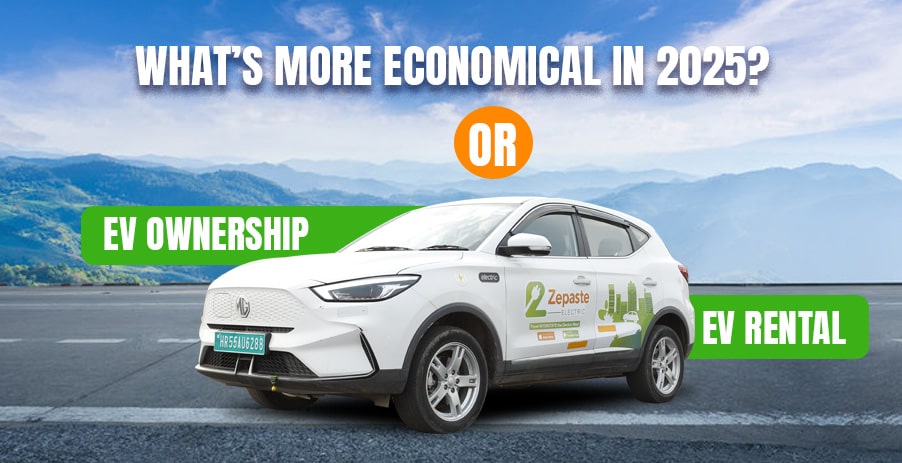
EV Rental or EV Ownership: What’s More Economical in 2025?
As of 2025, there's another option when you buy a new car in India, and it's a super appealing one: going electric. The fact that you could be receiving zero fuel costs is pretty tempting, but the associated costs offer a stark contrast. This has you standing on the fork in the road of cost: you invest lakhs to own an EV, or is there a cheaper way to participate in the new electrical revolution without spending all of your savings? Let's run the numbers. Well, this brings us to the great question for today’s city commuters: Is it better to buy an electric vehicle, or pay-as-you-go with renting an electric vehicle only when we need it?
We believe the answer is not solely based on the pricing. Let's take a look at the economics of using an electric vehicle that is owned vs. using an electric car rental option.
The Dream of EV Ownership: Looking Beyond the Showroom
Having a car has long represented freedom and hope and the notion of owning your own shiny new EV, with unlimited use at your beck and call, is enticing. The fuel costs are incredibly low, and you experience new driving dynamics with smooth and silent motion.
But, the expense of car ownership is much more than the sticker price at point-of-sale. In 2025, folks considering car ownership should be aware of:
- The High Upfront Investment: EVs are still more expensive than petrol options, meaning a larger deposit, and hefty monthly EMIs that could lock you in for years.
- Battery Depreciation: The number one hidden cost of an EV is depreciation. An electric vehicle's battery is the most expensive item, and it degrades with use. If you choose to purchase an electric vehicle 2nd hand, you are concerned about the battery degrading, and this fear of needing to replace the battery for a multi-lakh rupee charge down the road is a major decision-making financial concern.
- Charging Infrastructure: While charging infrastructure is only getting better, charging when you are away from home can still be challenging to do as a public user of charging. The best-case scenario is to charge at home, which incurs the cost of paying a contractor to install a charger, and is only applicable if you don't live in an apartment!
- Rapid Technology Advancements: The EV you buy this year, with its features and range in 3-4 years, will likely feel dated with the speed that technology advances and the development of newer electric vehicles, and owning a vehicle means you are locked into 2023.
- Insurance and Maintenance: While the cost of mechanical maintenance could be lower, these vehicles require specialized and unique technicians and parts which can be costly, while insurance premiums on EVs tend to be higher than fossil fuel alternatives.
The Smart Alternative: The Economics of an Electric Vehicle Rental
What if you could enjoy all the benefits of driving an EV with none of the financial burdens or long-term risks? This is the powerful proposition of an electric vehicle rental service like Zepaste. You can also refer to this to know more about the benefits of renting an ev :-
Let's have a look at the costing factor from a rental perspective:
- Zero Upfront cost: A major advantage is that there are no upfront costs. There is no large deposit or car loan to consider and your capital is completely open to invest or spend elsewhere.
- No Maintenance or Insurance Costs: Maintenance, repair and insurance are all managed by us. You don't get a surprise bill after booking your car; you book a car and drive.
- No Battery Headaches: We will take the long-term care of the battery and any replacement cost at the end of the life cycle. You are completely insulated from the largest deteriorating factor of EV ownership.
- Early Access to the Latest Models: An electric car rental fleet is continually updated. This means you do not have to feel stuck in an old model when there are constantly better range, technology, and comfort options available.
- You Pay For What You Use: For many city dwellers, a personal car sits parked for the majority of the week. With a pay for use model, you eliminate the cost of a depreciating asset that is sitting in your parking spot.
The Verdict: When Does Each Make Sense?
To decide what's right for you, consider your usage patterns.
EV Ownership might be economical if:
- You have a very high daily commute (e.g., over 80-100 km).
- You live in a house with dedicated parking where you can easily install a home charger.
- For undecided travel, you must have a vehicle available at all times.
- You are planning to keep the car with yourself for a very long time i.e around (7+ years) to spread out the initial cost.
To rent electric car makes more sense if:
- You are a city dweller who uses a car for weekend trips, errands, or occasional office commutes.
- If you want to stay away from any kind of car loan or emi burdens.
- You value flexibility and enjoy trying different types of cars and new technology.
- If you want to use Ev for Corporate transportation purposes.
The Future is On-Demand
In 2025, smart mobility is not about ownership; it's about access. For a growing number of people in India's bustling cities, the financial logic is undeniable: renting an EV offers a more flexible, affordable, and worry-free way to drive.
Why lock yourself into a single car when you can have access to an entire fleet of modern electric vehicles? Before you commit to a long-term investment, experience the freedom of on-demand driving.
Download the Zepaste app today to book your first ride. Discover the smarter, more economical way to drive electric.





